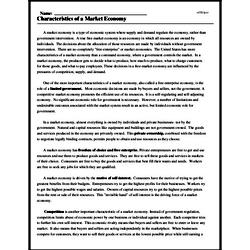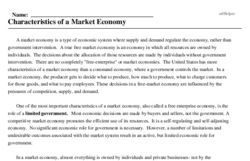Characteristics of a Market Economy
A market economy is a type of economic system where supply and demand regulate the economy, rather than government intervention. A true free market economy is an economy in which all resources are owned by individuals. The decisions about the allocation of those resources are made by individuals without government intervention. There are no completely "free-enterprise" or market economies. The United States has more characteristics of a market economy than a command economy, where a government controls the market. In a market economy, the producer gets to decide what to produce, how much to produce, what to charge customers for those goods, and what to pay employees. These decisions in a free-market economy are influenced by the pressures of competition, supply, and demand.
One of the most important characteristics of a market economy, also called a free enterprise economy, is the role of a limited government. Most economic decisions are made by buyers and sellers, not the government. A competitive market economy promotes the efficient use of its resources. It is a self-regulating and self-adjusting economy. No significant economic role for government is necessary. However, a number of limitations and undesirable outcomes associated with the market system result in an active, but limited economic role for government.
In a market economy, almost everything is owned by individuals and private businesses- not by the government. Natural and capital resources like equipment and buildings are not government-owned. The goods and services produced in the economy are privately owned. This private ownership, combined with the freedom to negotiate legally binding contracts, permits people to obtain and use resources as they choose.




